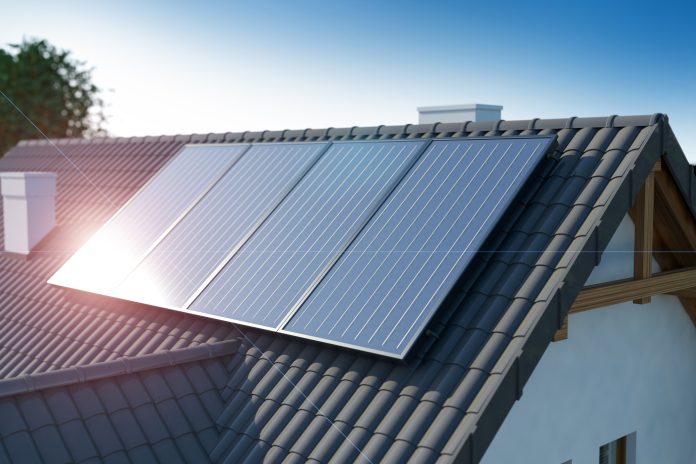It’s time to cut down on your electricity bill.
The average American household spends about $126 per month on electricity. If your monthly energy bill tops $100, then now is the time to look into ways to reduce your energy costs. A great way to do that is by investing in solar panels.
Yet, the upfront cost of solar panels can feel steep. Why not send your energy bill in the other direction immediately? Because installing solar panels could cost several thousand dollars.
That’s why we’re taking a look at the average cost of solar panels. You can gauge whether investing in solar energy is right for your household or not. Let’s dig in!
Depending on the Size of the Solar Panel
Solar panels are a great way to make energy cost savings, as well as to be kind to the environment. As solar energy is a renewable energy source, the cost of solar panels depends on the size of the system. Generally, smaller systems cost less than larger systems because there is less equipment that needs to be purchased and installed.
Furthermore, larger systems require more space to be installed. Generally, a 2kW solar panel system can cost around $3,000 – $4,500. A 4kw system can cost around $4,000 – $6,000.
A 6kw system can cost around $5,500 – $9,000. Generally, larger systems can cost around 20-30% more than smaller systems.
However, these costs can be reduced through subsidies and incentives or by receiving solar energy credits. Ultimately, the cost of solar panels will depend on the size of the system, and this should always be considered when deciding to invest in solar power.
Depending on the Location
The solar panel cost varies greatly depending on the location. In some sunny areas, the cost of solar panels can be lower relative to other areas. In those areas, solar panel installations can be subsidized by the government or through local rebates.
Which can potentially lower the overall cost of a solar panel system. Additionally, some areas may require specific materials to be used to meet certain requirements. Which can also drive up the price of solar panel systems.
In more remote, cloudy areas, the cost of home solar panels is often higher as shading and space for the system may be limited. To maximize the efficiency of solar panels, areas with more direct and consistent sunlight should be given priority, as costs can be more cost-effective. It is important to consider the amount of sunlight and space available when evaluating the cost of solar panels to ensure the system will be effective and relatively priced.
Depending on the Type of Solar Panel
Depending on the type of solar panels, the average cost can vary. Mono-crystalline solar panels are the most efficient and typically have the highest cost. Poly-crystalline solar panels are the second most common type and typically are the most cost-effective.
Thin-film solar panels are the least efficient but can be the most cost-effective based on their ease of installation. Solar panel kits and systems also can affect the cost of solar panels. DIY solar panel kits can be easy to install and cost-efficient but may require additional materials, which can add to the cost.
Professional installer kits may have a higher cost but can reduce the installation time and allow for more customization. Whether you go with a DIY or professional solar panel kit, the cost will depend on the type of panel and materials purchased.
Depending on the Installation Cost
The cost of installing solar panels is one of the biggest questions when considering going solar. On average, the total cost can range anywhere from $2.87 – $3.85 per watt, including installation. Factors that can impact the overall cost vary by state due to differences in labor, sales taxes, and more.
The location and surroundings of the solar panels can also affect the cost of installation. A flat rooftop, for example, will be much more cost-effective than an array constructed on a slope or curve.
It is important to account for financing, incentives, and other details when considering home solar installation costs. Professional guidance and proper research are key when determining the best option for your particular needs.
Depending on the State and Local Rebates
The average cost of solar panels depends greatly on the state and local rebates available. In some states, incentives like tax credits, grants, and even discounted electricity purchases from certain utilities can make a considerable difference in the cost of installing solar panels.
For example, in Hawaii, property tax exemptions for homeowners who install PV systems are available, as are discounted loan rates. In California, rebates apply to most residential and commercial solar installation projects. Many other states offer tax credits for solar panels, as well as other types of subsidies.
To get the most out of these incentives, be sure to research the incentives available in your state. Also, ask your installer about any special offers or programs before beginning your project. Investing time in researching the incentives, rebates, and other grants available can make a big difference in the total cost of solar panels.
Depending on the Brand and Quality of Materials
When it comes to solar panels and the cost related to them, it ultimately depends on the brand and quality of materials. It is possible to find panels for a few hundred dollars for a basic residential setup. This is while more powerful commercial solar setups can cost tens of thousands of dollars.
It is important to remember that the higher cost of a product does not mean higher quality. Poor quality materials can decrease the performance of any brand’s solar panel in many cases. Which can result in decreased durability.
To ensure that you are investing in the right solar panel system, it is important to compare different brands while taking into consideration the cost, quality, and energy production rate. While low-cost products may seem cost-efficient initially, in the long term, the price is often not worth the product that is offered. So to gain the best possible solar panel system, do your research and make sure to invest in quality materials.
Depending on the Size and Characteristics of Your Roof
The average cost of solar panels can vary greatly depending on the size and characteristics of the roof they are being placed on. The size of the roof area, the type and condition of the roofing material, the angle of the roof, and other factors will all influence the cost.
For instance, on a small angled roof, fewer solar panels may be necessary, but the angle may require special mounting hardware. This can result in a more expensive installation. Larger roofs may require more panels, but their flatness could result in a more economical installation.
Additionally, other factors such as the local climate, roof access, and wiring considerations will all play a role in the final installation cost. When considering solar, it’s important to take into account the initial cost of the installation. As well as the long-term savings you will see from the energy production from the solar panels.
Depending on the Permitting and Interconnection
The average cost of solar panels can depend heavily on the permitting and interconnection process. Solar installation in the US ranges from approximately $3.50 to $5.00 per watt before discounts. Individual panel costs are not available since most installers can build and install custom-tailored rooftop systems for each project.
This includes taking care of permitting, inspections, and other interconnection-related activities. These activities can vary greatly depending on the state and local jurisdiction that it is located in. This includes cost and timeline impacts on project completion.
This can also depend heavily on the size and complexity of the solar installation being considered. To get an accurate estimate of the cost of a solar installation, it is critical to include the permitting and interconnection-related costs in the project budget.
Depending on the Inverter
Most people don’t realize the average cost of solar panels depending on the inverter. The inverter plays a huge role in the cost of the solar panel installation. The inverter is often the most expensive item when it comes to getting solar.
It is important to choose an inverter with the correct wattage for your system to work correctly and efficiently. Inverters with a higher wattage will require a higher initial cost but can result in higher electricity production.
Which makes it more cost-effective in the long run to select a higher-end inverter. Depending on your particular system, an average 5 KW solar panel system could cost anywhere from about $7,000 up to $13,000 or more. Professional installation is almost always necessary, adding to the overall cost.
Knowing the Average Cost of Solar Panels Before Making a Decision
Installing Solar Panels can be a great way to save on your electricity bill. With the right information and setup, anyone can make the most of their investment. Getting the best solar panels might take time. However, it can be worth it.
To learn more about the average cost of solar panels, check out this complete guide for an in-depth look at the average installation cost. Start your journey now towards a clean energy future.
If you want to read more interesting articles, follow our daily blog post.

